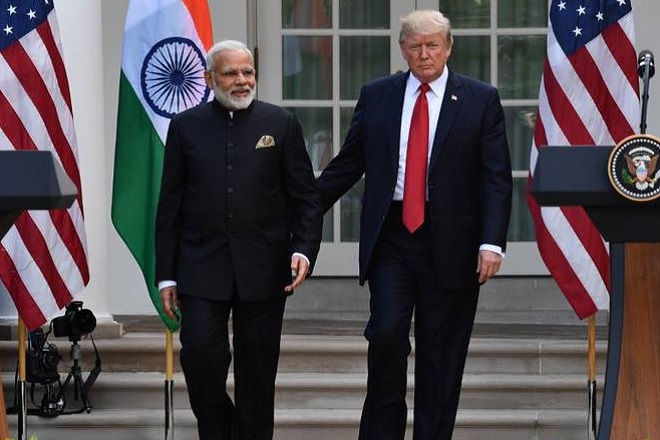By P.K.Balachandran
Despite words signifying undying friendship and bear hugs, which
marked President Donald Trump’s interaction with Indian Prime Minister
Narendra Modi in Washington on Monday, economic relations between the
United States and India seem destined to remain in the doldrums
indefinitely.
While there was a strong understanding on cooperation to tackle
terrorism and on defense purchases by India from the US, the sticking
point in the talks was the US$ 30 billion trade deficit which the US
has with India and the obstacles American investors face in India.
“I look forward to working with you, Mr.
buy antabuse online buy antabuse online no prescription
Prime Minister, to create
jobs in our countries, to grow our economies, and to create a trading
relationship that is fair and reciprocal. It is important that
barriers be removed to the export of U.S. goods into your markets, and
that we reduce our trade deficit with your country,” Trump told Modi.
Striking an optimistic note, Modi assured that there is no conflict
between his “Make in India” policy and Trump’s “America First” policy.
Modi described US as India’s economic partner.
However, the reality is that the odds are weighted heavily against any
change in the business situation in India, given the strong
anti-import lobby in that country, its convoluted laws and inefficient
bureaucracy.
The issues faced by American business in India were clearly spelt out
to Trump by a group of US lawmakers just days before he was to meet
Modi.
Leading U.S. congressmen called on Trump to press Modi to remove
barriers to U.S. trade and investment. The lawmakers, from the
Republican and Democratic parties, said in a letter to Trump that
high-level engagement with India had failed to eliminate major trade
and investment barriers and had not deterred India from imposing new
ones.
"Many sectors of the Indian economy remain highly and unjustifiably
protected, and India continues to be a difficult place for American
companies to do business," they wrote, noting that a 2017 World Bank
report ranked India 130th out of 190 countries for ease of doing
business.
The lawmakers - Republican House Ways and Means Committee Chairman
Kevin Brady and Ranking Member Richard Neal, and Republican Senate
Finance Committee Chairman Orrin Hatch and Ranking Member Ron Wyden -
said the bilateral economic relationship "severely underperforms" as a
result of India's failure to enact market-based reforms.
They said the barriers covered multiple sectors and included high
tariffs, inadequate protection of intellectual property rights, and
inconsistent and non-transparent licensing and regulatory practices.
Among U.S. goods affected were solar and information technology
products, telecommunications equipment and biotechnology products,
they said.
The lawmakers also pointed to limitations on foreign participation in
professional services, restrictive foreign equity caps for financial,
retail, and other major services sectors and barriers to digital trade
and Internet services.
The fact is that India accounts for only 2% of America’s Foreign
Direct Investment.
Making Up With Arms Sales
However, the US is expected to make up for its deficit somewhat,
through stepped up arms sales to India and that is what Trumped pushed
for at his meeting with Modi.
Trump bluntly asked Modi to buy more arms from the United States. And
like a true American salesman, he told Modi that no country in the
world makes military hardware as good as the US-made ones.
“Thank you very much for ordering equipment from the United States.
Always makes us feel very good. There’s nobody [that] makes military
equipment like we make military equipment. Nobody even close, so we
want to thank you very much," Trump said in the presence of the media
after talks at the White House.
The total value of Indian arms imports from the US has gone up to US$
15 billion in terms of contracts since 2008 and the US wants to sell
more as India has a huge appetite for it, being the second largest
buyer of arms in the world after Saudi Arabia.
Between 2008 and 2014, India had notched up arms purchases worth US$
34 billion.
By 2014, the US had supplanted Russia as the single largest seller of
arms to India. According to The Diplomat the US aircraft maker Boeing
alone has won bids to supply the Indian military with ten C-17
Globemaster-III strategic airlift aircraft (worth $4.1 billion), eight
P-8I maritime patrol aircraft (worth $2.1. billion), 22 AH-64E Apache,
and 15 CH-47F Chinook helicopters (both helicopter deals have a
combined worth of $2.5 billion).
The White House has also cleared the sale of 22 unarmed Guardian
drones for US$ 2 billion but this has to be sanctioned by Congress
because this sophisticated bit of gadgetry is made available only to
the closest allies.
India needs the Guardian drones for long range maritime surveillance
in view of increased Chinese activity in the Indian Ocean.
(– P.K.Balachandran is a senior Colombo-based journalist
writing on the countries of South Asia –)
Opinion: Despite Trump-Modi bonhomie, Indo-US economic relations in doldrums

